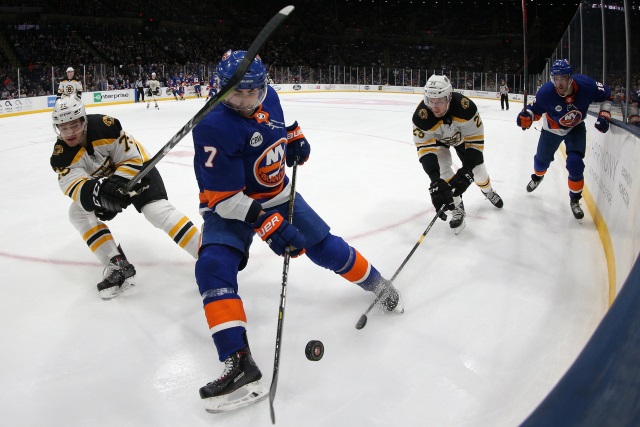Jordan Eberle signed a five-year, $27.5 million contract with the New York Islanders last Friday. New York keeps one of their scorers in place. What does this all mean? What impact may it have down the road? Let’s take a look.
Jordan Eberle contract explained
Again, thanks to CapFriendly, contracts are easier to dive into quickly. He earns $5,625,000 for the 2018-19 campaign. Jared Clinton of The Hockey News makes sense of it here. There is one important nugget:
Not to speculate too wildly on Eberle’s reasoning for taking less money in a market that seemed ripe for greater payment, either, but maybe that post-season performance is the very reason he landed on this number and this pact. There is more that has to go into a free agent’s decision than the financials, after all. It’s possible he feels that the Islanders’ success this past season is replicable, that he feels he really fits in the system and the fact he signed makes it clear enough that he desired to extend his stay with the Islanders.
The salary cap hit comes in at $5.5 million AAV for the deal. However, the salary is just a bit different. Eberle earns 90% of the salary in the first four seasons of the contract. Also, the total salary is $7.25 million for year 1 and $7 million for year 3. The first year includes a $2 million signing bonus. Furthermore, the other years are lower base salary than the AAV. It’s still a pay cut from projections no matter how it is sliced and that benefits the Islanders tremendously.
Now, there are some wrinkles with this deal. The new pact features a full no-trade clause in years one and two. Eberle submits a 16 team no-trade list for years 3-5. Simply, this deal buys some time and cap space for New York to sign Anders Lee and Robin Lehner.
The five years down that long and winding road for Jordan Eberle
Eberle is currently 29-years old. When the contract ends, Eberle will be 34 (past his prime likely). The question becomes what happens to New York during this new deal.
Lou Lamoriello emphasized building a winning culture. Year one showed that the Islanders could do that. Now, it becomes sustaining that culture.
How much does Eberle bounce back? There was instant playoff chemistry between him and Mathew Barzal. Some suggest last year’s dip was a blip and that could very well be the case. Is anyone expecting 70 points? Probably not. Is anyone expecting 35-40 again? Also, probably not. Eberle did average almost a full shot a game more on the net with Barzal on the ice so that may be something to note.
Eberle’s ice time jumped during the playoffs as he was one of their solid scoring options. That could happen a bit in the regular season as well. Do not expect 18-19 minutes but maybe somewhere around 17 or so. This may be number one sees throughout most of this next contract.
Some important notes
Among other things, we can use the charts from Sean Tierney here to help. Eberle left quite a few goals on the table this year as far as expected goals. However, his chances were so far off early in the season but rose quite a bit come playoff time.
Eberle is a player capable of playing top minutes as far as a power play and with opportunistic offensive situations. Fortunately, Barry Trotz manages ice time better than most any coach in the NHL.
Truthfully, if Eberle maintains his chemistry with Barzal, both will experience bounceback seasons in 2019-20. That will be vital for the Islanders in order to minimize the inevitable points regression many expect. Does anyone expect 30+ goals for Eberle? That answer is no. However, 25+ goals and 30+ assists are not unreasonable for the forward.
The later questions down the line form into this final one. What will Eberle be at age 32,33, or 34? New York sheltering Eberle with a possession stalwart like Barzal could go a long way in aiding offensive production and minimizing much regression.
Again, Barry Trotz’s system presents as more of an aid than a detriment to players like Eberle. There are other players who can play more defensively. All Eberle needs to do is produce more offense. He is more than capable of that.


